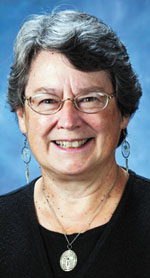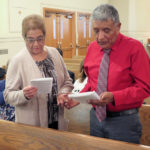By Corrine Winter
By the time this issue of The Messenger is published, Archbishop Oscar Romero will have been declared “Blessed,” that is one step from canonization. He was assassinated March 24, 1980, as he celebrated the Eucharist with his congregation.

For a number of years, some controversy surrounded the cause for Archbishop Romero’s canonization. While no one denied the heroism of his work on behalf of the poor, some wanted to call him a martyr for the faith, while others opposed that designation saying that he was murdered for his politics rather than for his faith. This past winter, Pope Francis stated that Archbishop Romero was killed out of “hatred for the faith” and therefore should be considered a martyr.
Archbishop Romero did speak up against atrocities committed against the poor by those who held political and economic power in his country. But he did so out of the conviction that to follow Christ in El Salvador at that time included accompanying those who were persecuted unjustly as Christ was. He neither promoted nor condoned violence; indeed, his pastoral letters show his deep desire for peaceful solutions. He did undertake nonviolent actions against the persecutors, including refusing to attend the inauguration of Carlos Romero as president of El Salvador; and he told aloud the stories he heard from the poor. With other priests and bishops, in accord with Catholic Social Teaching, he insisted on the dignity of all persons and on the rights of workers.
As I look at the life and teachings of Archbishop Oscar Romero, it seems to me that there are lessons applicable to us in Iowa as we once again become popular with so many political candidates. The relationship between politics and religion is rightfully an area of ongoing moral and theological discernment for Christians everywhere. Certain boundaries are clear. The Catholic Church does not endorse a candidate or a party. Nor do we ignore political issues as irrelevant to our faith, for the Incarnation of the Son of God calls us to attend to the fullness of life.
But that leaves a great deal to struggle with. Archbishop Romero himself struggled to understand his role as bishop in the issues he addressed. In fact, when he was made bishop, most expected him to keep silence about politics and the economy, believing that was the best way to preserve the freedom of the church. He himself underwent a profound conversion after seeing more closely and from different perspectives the effects of the unjust systems on the lives of his people.
While we certainly do not see the extreme violence that Archbishop Romero witnessed, we do see the effects of injustice. Like the archbishop, we may not be certain exactly where the solution lies, but we can identify and name what is opposed to human life and dignity and we can refuse to lend our support, even our tacit support, to those systems.
We can listen to the stories of those who suffer and can add our voices to help theirs be heard. We can ask the hard questions and refuse to be discouraged if that seems to have no effect the first, 20th, or 100th time.
The U.S. Catholic bishops continue to call our attention to church teaching as it is relevant to the issues facing us at election times and encourage us to call candidates to accountability with regard to those issues. They have recently called for protection of the most vulnerable to be a priority in setting national and local budgets and policies. As candidates find multiple ways to attract our attention and our votes, we can refuse to be distracted or manipulated by sales tactics and insist on being heard on behalf of all.
As I reflect on the life and work of Archbishop Oscar Romero, I would like to grow in courage, in the ability to view all of life in the light of faith, in the ability to listen and to learn from others and to stand in solidarity with them. And I would like to bring those qualities to my participation in the upcoming political processes.
(Corinne Winter is a professor of theology at St. Ambrose University in Davenport.)











